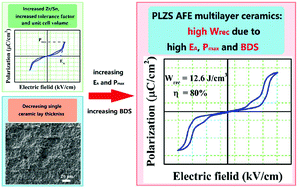High energy-storage performance of PLZS antiferroelectric multilayer ceramic capacitors†
Abstract
Multilayer ceramic capacitors in energy-storage applications have received increasing attention due to the advantages of high power density, low drive voltage and fast charge/discharge rates. However, the low energy density is a great challenge which limits the applications of multilayer ceramic capacitors. Here, an antiferroelectric Pb0.98La0.02(ZrxSn1−x)0.995O3 (PLZS) system is investigated and the corresponding multilayer ceramic capacitors with Pt inner electrodes are prepared. A record-high energy-storage density of 12.6 J cm−3 and a high energy efficiency of 80% are achieved in Pb0.98La0.02(Zr0.7Sn0.3)0.995O3 multilayer ceramic capacitors, which consist of five dielectric layers with a single-layer thickness of 20 μm. Furthermore, the newly developed capacitors also exhibit a wide temperature usage range of 25 to 120 °C and strong fatigue endurance after 106 cycles. These results suggest that the Pb0.98La0.02(Zr0.7Sn0.3)0.995O3 multilayer ceramic capacitors will be potential candidates for next-generation pulsed power capacitors.



 Please wait while we load your content...
Please wait while we load your content...